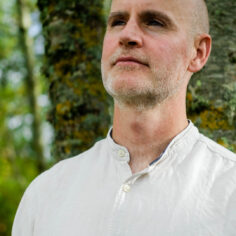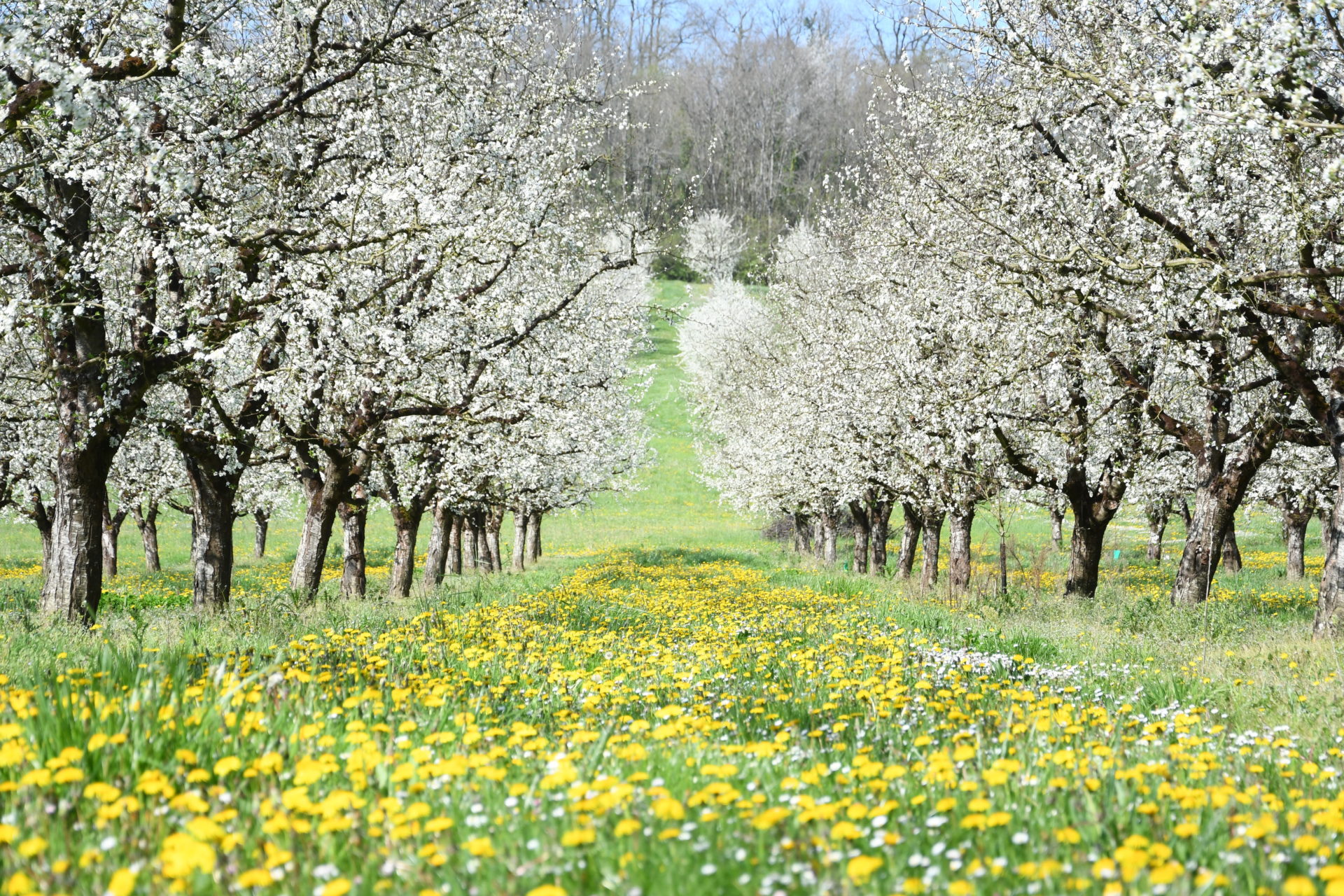By Mick McEvoy in March 2021

Mid-February 2020, I made the long and slow journey by boat from Cork in Ireland to Santander in the north of Spain. Two days and two nights. Slow and steady, with calm enough seas. I was able to drive off the boat on arrival and enjoy a week of slow travel along the Northern Spanish coastline and through the Basque Country before arriving back home in Upper Hamlet in Plum Village,
By Mick McEvoy in March 2021

Mid-February 2020, I made the long and slow journey by boat from Cork in Ireland to Santander in the north of Spain. Two days and two nights. Slow and steady, with calm enough seas. I was able to drive off the boat on arrival and enjoy a week of slow travel along the Northern Spanish coastline and through the Basque Country before arriving back home in Upper Hamlet in Plum Village, France. At that time, no talk of a pandemic had yet occurred. But only a few weeks later, the border between Spain and France would close and France would enter lockdown.
The day I arrived in Plum Village, the community announced that we would not open for our Spring Retreat, but would be closed to guests. I admit I was sad, as I was looking forward to welcoming guests after winter, and the first week of opening was due to be an Irish Retreat in Upper Hamlet.
For the Happy Farmers, this is the time of year when we move out of our slow winter rhythms and there is a need to seed. Soon the plant nurseries would be full of trays of seedlings representing harvests yet to manifest. Everything from salads to spring greens, tomatoes and aubergines, pumpkins, squash, and much more. A rather different spring season began on the Happy Farm.
Plum Village is often described as the United Nations of mindfulness. This year, the farm team or farm family was a microcosm of that reality. We had members from Iran, Italy, Canada, France, England, Germany, Scotland, and the Republic of Ireland. The media was filled with tough stories of sickness, death, grief, and hardship from many of these countries.
Once we entered lockdown in Plum Village, we were in a cocoon as a community, sheltering together. That feeling of community and connection was amplified when we gathered as a farm family for service meditation. I attempted to slow down, remembering the world was being forced to slow down. I attempted to tell myself again and again that I am living in a mindfulness practice centre. I am on retreat. Slow down. As I developed that intention, I constantly came into deep relationship with the soil, the seeds, and the shifting seasons. Even though the monastery was closed to guests, the Happy Farm team was stepping up a gear in our mindful service as the growing season began. Again, I shared with myself and the team to slow down.
Together, we aspired to develop the intention to work and practice with a collective sense of stillness and peace, and to cultivate joy, all whilst engaged in the hard, loving, and sweaty work of regenerative and organic farmers. However, we were acutely aware of how fortunate we were in those days to have space, to have nature, and to have community as we farmed. We meditated to be in touch with many of you who were shut indoors in the city, those of you who were sick, those of you who lost a loved one, those of you who work on the front line in our medical care teams, and those of you who face huge uncertainty in relation to your livelihoods and your futures.
The Happy Farmers aspired to connect to your suffering and hold you close to us in each mindful step, each mindful breath, and each seed sown in mindfulness. We contemplated: We know you are there, and we are happy. We are here for you too.
When we invited the farm bell and practiced stopping during our service meditations, we practiced with you and repeated this gatha: “Body, speech, and mind held in perfect oneness. We send our hearts along with the sound of this bell. May all who hear it awaken from forgetfulness and transcend the suffering of anxiety and sorrow, birth and death.”
For many community members, monastic and lay, including me, the fact that the world comes to Plum Village every year is one of the most beautiful elements of community life here. We see many individuals, couples, and families who join us here on retreat and who experience the universal human reality of challenges and suffering in their lives. The majority can taste and experience a flavour of transformation after a week spent here together. Knowing that this was on pause for at least the spring was challenging for many of us, although I also felt that this was a good opportunity for the monastic and lay community to take a rest.
Soon the community had to make the decision to remain closed for the rest of the year. When these decisions were made, the farm had to consider whether to adapt our planting plan for the year. Normally we seed and plant so that we can reap the majority of the harvest during the months of June, July, and August when we have a full house of guests. What do we do when we have no guests? Many community members had many opinions. “Grow less, take a rest,” or “grow more, as the food distribution systems will be collapsing”? In the end, we decided to stick with our plan and cultivate the farm as in a normal year. This was made possible by having great communication and support from our two monastic brothers who serve as the shoppers in Upper Hamlet and Son Ha. They are responsible for buying the extra food we do not cultivate on the farms. Together, with great harmony and brotherhood, we decided to make the most of our annual harvest and showcase the high quality of the organic and seasonal food we produce within the community.
As the weeks went by, spring moved to summer. This is peak season for the Happy Farm. The harvest is flowing. Salads and greens, courgettes and tomatoes: abundance. One of the highlights of the farm year is when our team doubles in numbers as we welcome volunteers for the summer season. This year we were due to welcome five friends for May, June, July, and August. But that was not possible. As the guy with the responsibility to manage the project, some anxiety bubbled up in me. The team needed a rest at some point in the summer, but the farm was pumping out the food. We had to keep harvesting, and we were a really small team.
At this point, Sangha eyes came into play. The abbot of Upper Hamlet, Brother Phap Huu, and the monastic caretaking council approached me with a fantastic offer: a big group of monastic brothers and lay friends could come to the farm for a community work morning every two weeks. “Would that be of help?” asked Brother Phap Huu. Absolutely! Not only was it a helping hand, but it also brought the farm family closer to the monastic community. The farmers hosted the brothers and shared about our service meditation and our practice on the farm. Appreciation for the nature of the hard, loving, and sweaty work took on new meanings for all of us. Together, we met the needs of our farm and our farm family. We hoped we planted seeds in the consciousness of many monastic brothers in relation to how important it is to have regular access to nature and the soil, and to cultivate the skills to grow our own food as a community—all whilst serving with mindfulness, joy, and happiness. As I write, France is due to begin another month-long lockdown in September. Reflecting on this year of the pandemic, gratitude arises naturally and steadily when I get in touch with the conditions I have been fortunate to experience during this time. I express my deep gratitude to live in community. Each day there is joy, happiness, and true sisterhood and brotherhood. This for me is amplified as we are a spiritual community, sharing a spiritual path. During lockdown, I experienced great gratitude for a routine—a schedule that included communal daily mindfulness practices: sitting together, walking, eating, gathering in a circle to share, and coming together to listen to the Dharma.
But my deepest gratitude is reserved for Mother Earth. In Upper Hamlet, we have over seventy acres of nature to explore and experience. I take deep refuge in the oak forests and lakes where I swim, in the wildflower meadows and the wondrous beauty of our organic farm. As I contemplate one more month of lockdown, I will go out into the forest, kneel down, and touch the earth under me and within me, surrendering to Mother Earth in the knowledge that I am not other than her.


